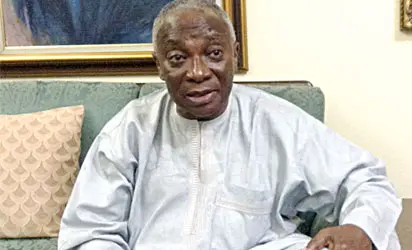WHEN Chief Philip Asiodu reflects on the Nigerian condition, we learn very useful lessons. That is why I always read with relish every interview done with that remarkable man. And early this week, VANGUARD newspaper gave us very juicy servings from a venerable Nigerian whose long life at about eighty has allowed him to live through some of the momentous events that defined Nigerian history.
He saw the years leading to independence and has been lucky to play very active roles at different junctures in the development of Nigeria.
It seems obvious from reading Chief Asiodu, that he was lucky to have seen some of the highpoints of Nigerian development, including the achievements that came from an honest and efficient deployment of the national will and he has, unfortunately, also seen the points when the rot gradually began to set in, leading to the troubling reality of contemporary Nigeria. It is easier to stroll the shores of hindsight, but no nation can find its way out of the morass of underdevelopment when there is no active sense of connection with what had been achieved before. Memory is a very useful navigational aid!
Unfortunately, from Chief Asiodu’s experience, the mass purge in the civil service in 1975, will rank as one of the worst decisions of post-independent Nigeria.
He was a victim; but beyond that, as an intellectual, he was also able to gauge the long term impact of that momentous decision: “I was retired and I was the number one civilian among those retired with immediate effect!
Later on, the military added an amazing phrase to our sack saying that it was done with increasing alacrity! It shows how people were not really thinking through what they were doing at that time”. The consequences were dire: “When the service was truncated and dislocated, we were left without role models to ensure that there is institutional memory…It didn’t do us good because we lost institutional memory…”
But a lot more got lost in that period of shock that was akin to madness: “In our days we used to send people to schools to get their best graduates even before they graduated. We made the civil service the preferred destination…So with the great shock of 1975, stars were driven out of the service. They made sure that the civil service was no longer the choice destination. My father was a civil servant, which was attractive then.
If someone did not die early in service, that person was sure of being comfortable. It was not the route to becoming the richest man in the country”. These were the words of Chief Philip Asiodu. And it is clear that Nigeria has continued to suffer the consequences of the choice made in 1975, just as much as the irresponsible abandonment of planning regimes has come to haunt us in practically every area of national endeavour.
Governance structure
I think the interview has come at a very important time, when President Muhammadu Buhari has also begun to tackle head-on the accumulated rot of the past couple of years in our governance structure. There were processes in the past that kept systems functional and were able to assist in effective delivery of service to the Nigerian people. The problem emerged when the subversion of processes became the new way to keep going because that offered advantage to individuals to fester personal nests.
This is why the memory of individuals as venerable as Chief Philip Asiodu, can be very useful banks from which to lend wisdom for the re-charting of the course of national re-birth. Memory is very important in creation of the new, since we cannot chart the routes of progress where we have not sufficiently identified the progress we made before and those points where we derailed.
I have always learnt very useful lessons about the history of Nigeria; the structures of its administration and the wonderful architecture of planning that allowed Nigeria to rapidly advance at certain historical junctures. At the same time, I have also seen more clearly the pitfalls that have defined the problems that we confront today!



